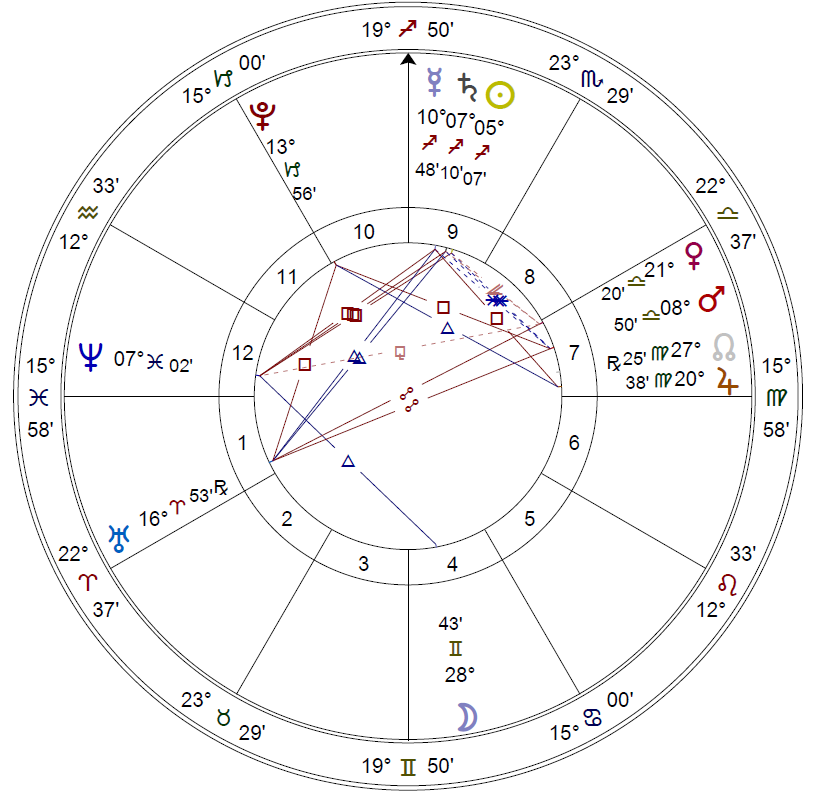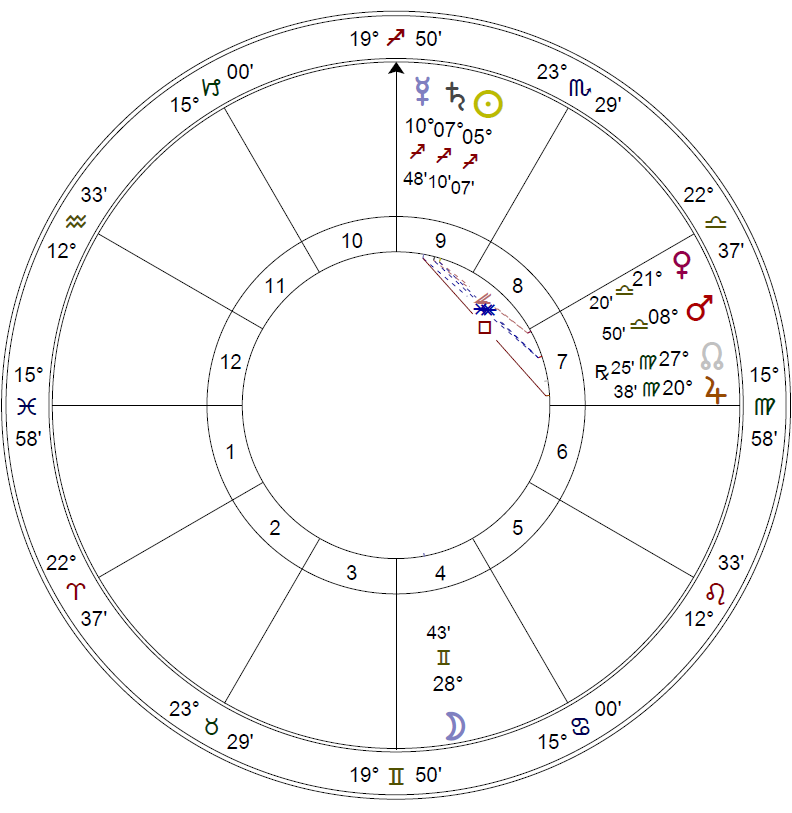Conoce lo que el investigador español Juan Estadella tiene que decir al respecto de esta futura publicación.

Can Uranus, Neptune, and Pluto be relevant to clinical diagnosis?
abril 16, 2024
Autor: David Bustamante S.
Astrology can help achieve accurate clinical diagnoses. Psychiatric, neurological, and psychological knowledge, however, is needed in astrology, and vice versa.
A birth chart (of a relative) for which I was asked by a member of my family to review and provide inputs suggests certain cognitive issues. Among these, the possibility of schizophrenia and well-proven clairvoyance, which was later corroborated by an unofficial (because of the native’s early age) statement from an expert in the neurological field.
Visualize chart without Uranus, Neptune, and Pluto by scrolling all the way down. (Private data, for which reason the author understands that credibility may be little. We’ll make another post in the following days wherein we will provide known AA Rodden-rated charts; musicians, among them.)
The reason for which I spoke of both tendencies is due to not just the Sagittarian planetary grouping. I considered clairvoyance confirmed by Neptune conjunct the ASC under the influence of the very ascending sign, no less (Pisces). I considered (propensity for) schizophrenia confirmed by Neptune holding said position in the chart while, at the same time, holding a quadrature with the Mercury-Saturn mutable fire sign-sustained conjunction, Mercury also influencing the 3rd House by virtue of its quadrant 19º degrees in it. Because Saturn holds a tense relationship with Jupiter (in Virgo, neurological), opposed the ASC (while holding a quadrature with Mercury in the 9th House under the influence of Sagittarius), Saturn affects Mercury more than it would, otherwise, have been able. [1] Is this, however, enough to confirm a clinical diagnosis? That is, is it enough in order to be able to be specific about the “cognitive issues” in question?
There are charts presenting this Sagittarian planetary grouping (the 3rd and 1st Houses included) and do not show said propensities, although some sort of extrasensory perception may appear. Neptune (as, in other cases, Uranus and Pluto also) then can, at least in this case (as in Rosa Parks’ case), help confirm a clinical diagnosis where the planets up until Saturn (as seen from the Sun outward) would otherwise have fallen short. Did I say, “up until Saturn”? Doesn’t Saturn represent limits and limitation, restrictions and constraints? Precisely.
On the other hand, because the consultant ask about “gene pool”, in speaking about genetics I also suggested that the native, most probably, is not heterosexual, but either homosexual or bisexual (we have come to learn, as expected, that sexual orientation is predominantly genetically, not environmentally based, and almost strictly-related to the hypothalamus. See Sanders, et al. 2017). The mother of the native replied: “Hm. That has started to show already. Though I wasn’t sure.” I added: “Well, I’m not sure either, but it seems so. Let me know when […] grows up a bit more. If I am right, I need to know, and all the more if I am wrong.” I defend the homosexual component in light of both the quadrature between Mercury (neurological) and Neptune (endocrinological) in the 12th House (endocrine-oriented) influencing the 1st (by “dragging”, if you will) [2] and the opposition between Venus (hormone-oriented) and Uranus (disruptive) in the 1st House under the sign of Mars, which, in turn, appears in the opposite region of the chart, contrary to the ASC.
PS: Neither Uranus nor Neptune and Pluto constitute a different principle from Mercury, the moon/Venus, and Mars. They only resume their significations from the point where they left them. Because of their position in the solar system, they cannot go as far as. [3] Mercury and the moon, though highly cognitive, cannot go as far as Uranus and Neptune with regard to neurological and endocrinological issues, respectively. Mars, though highly explosive and swift, cannot be as deadly and necrotic, toxic and venomous as Pluto (not by itself, that is, only under certain planetary arrangements, say, holding a square with Saturn, Mercury, and/or the sun, and we speak of independently-based symbols or significations, not chart- or delineation-wise).
_____________________
[1] This Neptune-based confirmation of propensity for X or Y resembles Rosa Parks’ propensity for mental illness: see her Moon-Neptune opposition between the 1st and 7th Houses at birth.
[2] A planet lodged in a house occupying the cusp sign of the following house pours or spills its effects in both the house in which it is lodged (primarily) and the next (secondarily). Especially in this case, as Neptune (giant) remains very near the ASC.
[3] Yes, a body’s position in the solar system seemingly has much to do with its symbol; Sun being the example most obvious. Please see a recent dissertation on this, on the “Astrophysical justification of the astrological symbols” (as from the Spanish original manuscript): https://philarchive.org/rec/BUSJAD (DOI 10.5281/zenodo.10463824) To be available in English soon (translation in the works).










